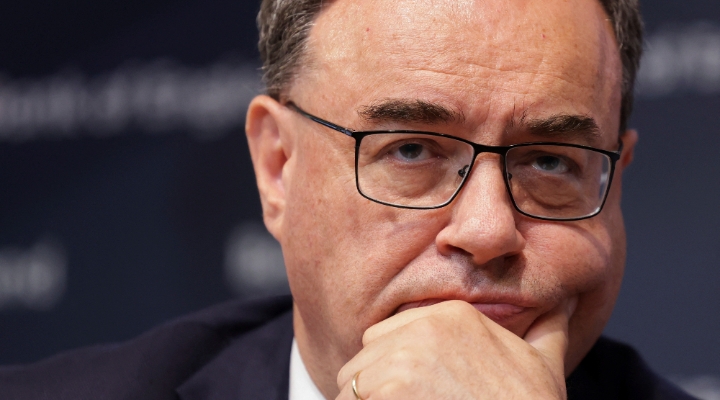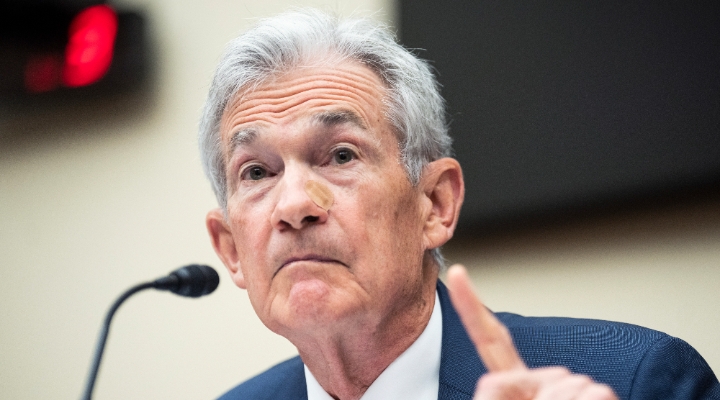
The Bank of England (BoE) has held its base rate at 5.25%, after a majority decision of 7-2 at its Monetary Policy Committee (MPC) voted in favour of keeping the status quo at a meeting yesterday.
The move was in line with market consensus. At the time of writing the FTSE 100 was trading up slightly by 0.38%.
"At its meeting ending on 8 May 2024, the MPC voted by a majority of 7–2 to maintain Bank rate at 5.25%. Two members preferred to reduce Bank Rate by 0.25 percentage points, to 5%," the Bank said.
In its press statement at midday today, the BoE added that, in time, it actually now expects inflation to fall to below its 2% target within two years, though it will likely rise in the near-term before falling once more.
"CPI inflation is expected to return to close to the 2% target in the near term, but to increase slightly in the second half of this year, to around 2½%, owing to the unwinding of energy-related base effects," it said.
"There continue to be upside risks to the near-term inflation outlook from geopolitical factors, although developments in the Middle East have had a limited impact on oil prices so far.
"Conditioned on market interest rates and reflecting a margin of slack in the economy, CPI inflation is projected to be 1.9% in two years' time and 1.6% in three years in the May Report."
It gave very little indication of when the rate cutting process might begin.
"The MPC remains prepared to adjust monetary policy as warranted by economic data to return inflation to the 2% target sustainably," it said generically.
"It will therefore continue to monitor closely indications of persistent inflationary pressures and resilience in the economy as a whole, including a range of measures of the underlying tightness of labour market conditions, wage growth and services price inflation."
Reaction From The City and Financial Services
Ben Nichols, Interim Managing Director, RAW Capital Partners:
"That the base rate has remained static for nine months has afforded homebuyers and investors a degree of certainty. But higher borrowing costs will continue to squeeze house prices, and this will naturally weigh on the minds of both buyers and sellers. Moreover, it places the emphasis on how lenders and brokers can best support borrowers in this higher-rate environment."
Michael Field, European Market Strategist, Morningstar:
"Two members of the nine-person committee voted to cut rates, up from a solitary vote last time around. May was too early for a rate cut to take place, but the direction of travel is certainly in the direction of rate cuts in the near term.
"The Bank of England gave plenty of caveats, highlighting that inflation has fallen, but that the services component remains elevated, with overall inflation of 3.2% still well above the Bank’s 2% targeted level. It also spoke about market expectations, highlighting that although rates will likely fall, they will not fall by as much as investors had expected when asked earlier this year.
"Before today’s announcement, economists were split between expecting the first rate decision next month or indeed sometime in the third quarter. Ultimately though, whether the first rate cut comes as early as next month, in line with expectations of the European Central Bank, remains to be seen. But the language and tone of today\s statement tells us that either way it will be sooner rather than later."
Lily Megson, Policy Director, My Pension Expert:
"While high interest rates are often touted as good news for savers, the harsh reality is that an unchanged base rate feels like Groundhog Day for Britons.
"Indeed, the hold comes hand in hand with the ongoing burden of sticky inflation and the weighty cost of borrowing. For some savvy savers, there is a silver lining to continued higher rates – namely, strong returns on fixed-term products like annuities. Yet in truth inflation has not fallen quickly enough, with millions struggling to save for long-term goals such as retirement.
"People should not be left to weather this storm alone, as the government has a critical role to play in ensuring access to independent financial advice and guidance for all. And with a general election fast approaching, it’s in their own interest to take action sooner rather than later."
How Would a Future Interest Rate Cut Affect Me?
As the Bank announces another rate hold, chatter turns to when the cutting cycle might begin. But what would that mean for consumers, and, crucially, those with savings and investments?
As interest rates decrease, cash savings rates on bank accounts and ISAs will likely decrease, meaning savers may start getting less bang for their buck at the bank.
However, lower rates will also make consumer debt cheaper, which could bring relief to people with substantial credit card debt – and mortgage holders with variable-rate products. Those who have remortgaged into fixed-rate products in the last two years may not feel this until they remortgage once more.
What Will Equities and Bonds do if Rates Are Cut?
Markets tend to "price in" any changes very quickly, so the reaction to this kind of news will be swift. Conventional wisdom suggests rate cuts are better for equities than bonds. But while bonds have returned to favour in the higher interest rate era because of their tempting yields, rate cuts may not be bad for them either.
Falling interest rates mean lower yields, which push bond prices ever higher – a key factor in total returns. And lower rates make existing bonds, and particularly those already issued during a period of rate hikes, more attractive for yield.
In addition, many pension funds, for whom rising bond yields have caused havoc, could also stand to benefit from a looser monetary approach. This may well benefit the government’s attempts to reignite the UK’s stagnant economy as (in theory) it encourages institutional investors to plough money into promising growth businesses.
How Will The Real Economy React?
Over in the "real economy", the unwinding of monetary policy will likely also benefit shops and online businesses who have been squeezed by the twin spectres of supply chain inflation and lower consumer confidence. If higher interest rates have the power to curb spending in the UK economy and cool gross domestic product growth, lower rates will in theory create the opposite effect.
In practice, however, there is a lot of uncertainty. While lower interest rates tend to stimulate the economy, the UK is still expected to suffer from low growth in the coming years wherever rates end up. Either way, it will take time for the precise effects to be visible, let alone quantifiable.












.jpg)
















